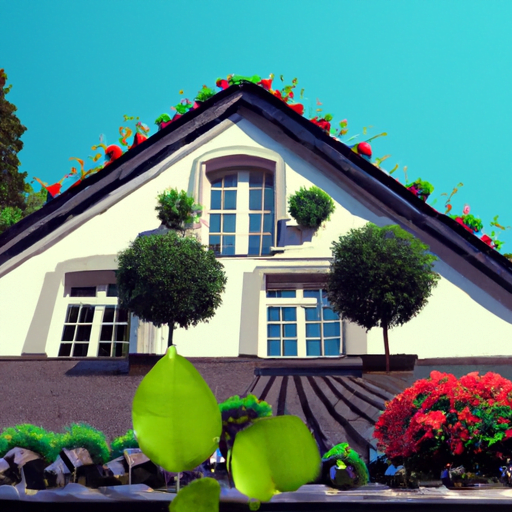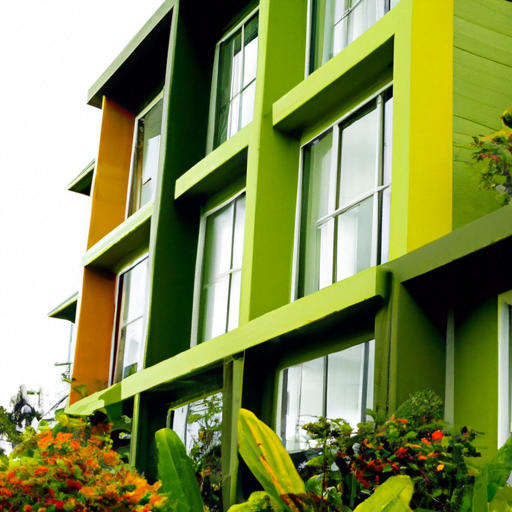So, have you ever wondered about living off the grid? You know, disconnecting from the traditional power grid and relying on alternative sources of energy like solar panels or wind turbines? It’s definitely an interesting concept, but have you ever thought about hybrid living? You might be wondering, what exactly is hybrid living? Well, it’s all about combining the best of both worlds – incorporating renewable energy sources while still staying connected to the main power grid. In this article, we’ll delve into the pros and cons of hybrid living, so you can decide if it’s the right fit for you.
When it comes to off-grid living, the main advantage is the freedom and self-sufficiency it offers. You have complete control over your energy consumption and can live a more sustainable lifestyle. However, it also comes with its fair share of challenges. Limited access to amenities such as water and internet, as well as the high upfront costs of setting up an off-grid system, can make it a daunting choice for some. That’s where hybrid living comes in.
Hybrid living allows you to enjoy the benefits of renewable energy while still being connected to the main power grid. This means you have a backup source of electricity in case your solar panels or wind turbines don’t generate enough. It also gives you the ability to sell excess energy back to the grid, potentially saving you money in the long run. However, it’s important to consider the potential drawbacks as well, such as the ongoing costs of maintaining and upgrading your hybrid system.
So, now that you have a basic understanding of hybrid living, are you curious to learn more about its pros and cons? In the following article, we’ll dive deeper into the topic, discussing everything from the environmental benefits to the financial implications. Whether you’re considering making the switch to hybrid living or just want to explore alternative energy options, this article will provide you with the information you need to make an informed decision.

Exploring the Pros and Cons of Hybrid Living
Living a sustainable lifestyle has become a growing trend in recent years, with more individuals seeking ways to reduce their carbon footprint and become more self-sufficient. Two popular options that often come up in this conversation are off-grid living and hybrid living. While both approaches offer unique benefits, there are also downsides to consider. In this article, we will explore the pros and cons of each, helping you determine which option is best suited to your preferences and circumstances.
Pros of Hybrid Living
Reduced carbon footprint
One of the major advantages of hybrid living is its ability to significantly reduce your carbon footprint. By utilizing renewable energy sources, such as solar panels or wind turbines, you can greatly reduce your reliance on fossil fuels and decrease greenhouse gas emissions. This environmentally-friendly approach allows you to contribute to the fight against climate change while still enjoying the comforts of modern living.
Access to modern conveniences
Unlike off-grid living, hybrid living provides you with access to modern amenities and conveniences. You can still connect to the electrical grid when needed, ensuring a steady supply of power even during times when renewable sources may not be sufficient. This means you can rely on your refrigerator, air conditioning, and other appliances without any interruption. Additionally, you can make use of the internet, television, and other technologies that are often considered essential in today’s world.
Ability to generate renewable energy
Hybrid living allows you to generate your own renewable energy while remaining connected to the electrical grid. This means you can take advantage of the free, abundant power provided by the sun or wind and use it to meet your energy needs. Any excess energy you produce can be sent back to the grid, earning you credits or even monetary compensation depending on the policies in your area. This ability to generate renewable energy not only helps the environment but also provides you with a sense of empowerment and independence.
Greater independence
Hybrid living offers a level of independence that can be appealing to many individuals. By generating your own energy, you are less reliant on utility companies and fluctuations in energy prices. This can provide a sense of security, knowing that you have control over your energy supply and are not subject to the whims of external factors. Hybrid living also allows you to be less dependent on conventional infrastructure, such as water and sewage systems, as you can implement alternative solutions like rainwater harvesting and composting toilets.
Lower utility bills
Another advantage of hybrid living is the potential for lower utility bills. By generating your own energy and reducing your reliance on the grid, you can significantly decrease your monthly expenses. While the upfront costs of setting up renewable energy systems can be higher, the long-term savings can make it a worthwhile investment. By harnessing the power of the sun or wind, you can enjoy reduced or even eliminated energy costs, allowing you to allocate your financial resources to other areas of your life.

Cons of Hybrid Living
Higher initial costs
One of the main drawbacks of hybrid living is the higher initial costs compared to conventional living. Installing solar panels, wind turbines, or other renewable energy systems can be quite expensive. While the long-term savings can offset these costs, it may take several years to recover the initial investment. This financial commitment can be a significant barrier for some individuals who may not have the resources to make the upfront investment.
Maintenance challenges
Maintaining and troubleshooting renewable energy systems can be challenging for those who are not familiar with the technology. Solar panels may require regular cleaning and occasional repairs, while wind turbines may need maintenance for optimal performance. Additionally, batteries used for storing excess energy may require periodic replacement. It is important to consider these potential maintenance challenges and factor them into your decision-making process.
Dependence on conventional infrastructure
Although hybrid living offers a level of independence, there is still a degree of dependence on conventional infrastructure. During times when renewable energy sources are not sufficient, such as on cloudy days or during periods of low wind, you will need to rely on the electrical grid for power. This means you are still vulnerable to power outages and fluctuations in energy prices. It is essential to have a backup plan in place to ensure uninterrupted power supply during these periods.
Risk of power outages
While hybrid living can provide a certain level of independence, there is still a risk of power outages during extreme weather events or grid failures. In such situations, even if you have a backup generator or battery storage, there is no guarantee of continuous power supply. Being prepared for these scenarios and having alternative sources of energy or backup power systems is crucial to ensure you can maintain your desired level of comfort and functionality.
Limited energy storage capacity
Hybrid living often relies on energy storage systems, such as batteries, to store excess energy for later use. However, these storage systems have limitations in terms of capacity. Depending on your energy needs and the size of your storage system, you may find yourself facing limitations and potential energy shortages during times of high demand or low energy production. Balancing your energy consumption and managing your energy storage effectively is key to getting the most out of your hybrid living setup.
Pros of Off-Grid Living
Complete self-sufficiency
Off-grid living offers the ultimate level of self-sufficiency. By disconnecting from the electrical grid, water supply, and sewage systems, you become fully responsible for meeting your own needs. This includes generating your own power, collecting and purifying water, and managing waste. This level of autonomy can be highly appealing to those seeking to live independently and reduce their reliance on external resources.
Less reliance on external resources
One of the significant advantages of off-grid living is the reduced reliance on external resources. By producing your own power, harvesting rainwater, and implementing sustainable waste management practices, you become less dependent on utility companies and municipal services. This not only allows you to have greater control over your resources but also insulates you from the potential disruptions or price fluctuations associated with conventional infrastructure.
Freedom from utility bills
Off-grid living offers the freedom from monthly utility bills. By generating your own power and managing your resources efficiently, you can eliminate or drastically reduce your expenses related to electricity, water, and sewage. This financial freedom allows you to allocate your resources to other aspects of your life, such as improving your off-grid systems or investing in sustainable practices.
Minimal environmental impact
When living off-grid, your environmental impact is significantly reduced. By generating your own power from renewable sources and implementing sustainable practices, you are not contributing to the carbon emissions associated with conventional living. Off-grid living promotes a more harmonious relationship with the environment, as you take personal responsibility for the resources you consume and the waste you produce.
Strong connection with nature
Living off-grid offers a unique opportunity to connect with nature on a deeper level. With fewer distractions from technology and modern amenities, you can immerse yourself in the natural world and appreciate its beauty and tranquility. You have the freedom to explore the outdoors, grow your own food in a garden, and live in harmony with the rhythms of nature. This connection with the natural world can provide a sense of fulfillment and well-being, often missing in the fast-paced, technology-driven modern lifestyle.
Cons of Off-Grid Living
Lack of modern amenities
One of the major challenges of off-grid living is the lack of access to modern amenities and conveniences. Living off-grid often means forgoing certain modern technologies, such as constant internet connectivity, television, or other electronic devices. This lifestyle choice requires a significant adjustment to a simpler and more self-reliant way of life, which may not be suitable for everyone.
Limited access to certain services
Living off-grid can also mean limited access to certain services. Depending on your location and the infrastructure available, you may face challenges in accessing medical care, emergency services, or other important services. It is important to carefully consider these limitations and have contingency plans in place to ensure your safety and well-being.
Higher upfront investment
Similar to hybrid living, off-grid living requires a higher upfront investment compared to conventional living. Setting up the appropriate infrastructure, such as solar panels, water collection systems, and waste management solutions, can be costly. The initial investment may deter some individuals who are not willing or able to make such a financial commitment.
Challenges in adapting to off-grid lifestyle
Living off-grid comes with its own set of challenges and may require significant adjustments to your lifestyle and mindset. It requires learning new skills, such as maintaining renewable energy systems and managing resources efficiently. Adapting to a simpler way of life, with limited access to amenities and relying on your own capabilities, can be a daunting task for many individuals.
Potential isolation
Living off-grid, especially in remote areas, can lead to a sense of isolation. Being disconnected from the larger community and social networks can be challenging for some individuals who thrive on social interaction and a sense of belonging. It is important to carefully consider your own social needs and preferences before embarking on an off-grid lifestyle.
Hybrid Living: The Best of Both Worlds
Hybrid living offers the best of both off-grid living and conventional living, allowing you to strike a balance between self-sufficiency and modern comforts. By utilizing renewable energy sources while staying connected to the electrical grid, you can enjoy the benefits of both approaches. This flexibility allows you to adapt to changing circumstances and choose the level of independence that suits your current needs and preferences.
By adopting hybrid living, you can effectively reduce your carbon footprint without sacrificing modern comforts. You can generate your own renewable energy and contribute to the fight against climate change, while still enjoying the convenience and stability provided by the electrical grid. Hybrid living also allows you to switch between off-grid and hybrid mode as needed, providing you with the versatility to adjust your lifestyle based on changing circumstances or personal preferences.
Conclusion
In conclusion, both hybrid living and off-grid living have their own pros and cons. The choice between the two ultimately depends on your individual preferences, circumstances, and commitment level. Exploring the possibilities of hybrid living can provide a unique and sustainable lifestyle that combines the benefits of both approaches.
Hybrid living offers a middle ground between off-grid and conventional living, providing reduced carbon footprint and access to modern conveniences. While there are pros and cons to both hybrid and off-grid living, it is essential to carefully evaluate your needs and priorities before making a decision. Ultimately, the most important aspect is choosing a lifestyle that aligns with your values and allows you to live a fulfilling and sustainable life.




